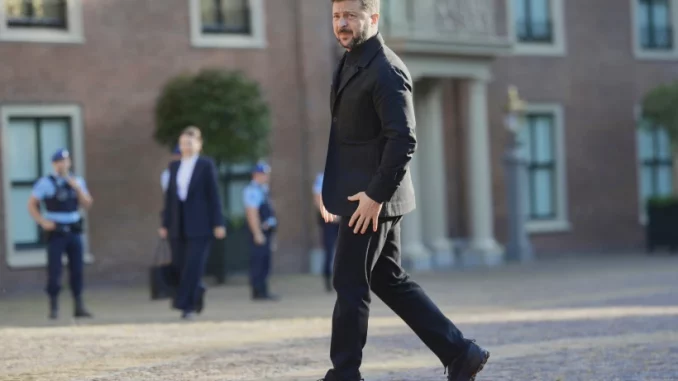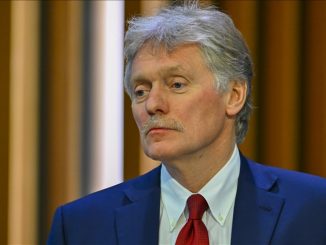
Ukraine’s President Volodymyr Zelenskyy arrives ahead of a formal dinner at the Paleis Huis ten Bosch ahead of the NATO summit in The Hague, Netherlands, Tuesday, June 24, 2025. (AP Photo/Markus Schreiber)
| Published June 25, 2025
Ukrainian President Volodymyr Zelenskyy has taken a historic step by officially signing a treaty to establish a special international tribunal aimed at prosecuting top Russian leaders for the 2022 invasion of Ukraine. This groundbreaking move, made in cooperation with the Council of Europe, seeks to fill a major legal gap left by existing institutions like the International Criminal Court (ICC), which cannot pursue charges of aggression against non-member states such as Russia. Backed by dozens of countries and legal experts worldwide, the tribunal represents a bold push to ensure that those who orchestrated the war are held accountable at the highest levels.
🏛️ What’s happening now?
-
Zelenskyy to formally sign agreement
On Wednesday, June 25, 2025, President Volodymyr Zelenskyy signed a treaty with the Council of Europe in Strasbourg to establish a special international tribunal with jurisdiction over the “crime of aggression”—which existing bodies like the ICC cannot prosecute for non-member states like Russia. -
Purpose & powers
This tribunal is designed to hold top-level Russian officials (likely president, PM, foreign minister, military leadership) accountable for planning and executing the invasion. With jurisdiction over aggression, not just war crimes, it fills a legal void left by international courts . -
Jurisdictional details
Trials can proceed in absentia, and cases can begin against sitting leaders—but formal charges must wait until immunity lapses (e.g., they leave office). There’s no statute of limitations for aggression under international law. -
Location & funding
The Hague is a leading candidate for the tribunal’s home, thanks to legal infrastructure and archives. Funding will come from a “Core Group”—including Netherlands, Japan, and Canada—with prior U.S. support under Biden (though not under Trump). -
Next steps
Now that the legal documents are signed, Ukraine and CoE will finalize administrative logistics—court location, staffing, case files—and aim to launch by early 2026 .
 Support and Opposition
Support and Opposition
✅ Support
-
Ukraine and Council of Europe: President Zelenskyy and CoE leaders champion the tribunal as a long-overdue mechanism to hold Russia’s top officials accountable for initiating an illegal war of aggression.
-
International Backing: Over 40 countries—including the EU members, Canada, Japan, and previously the U.S. under the Biden administration—have expressed strong support, citing the need to close legal loopholes that shield aggressors from justice.
-
Legal Experts: International jurists view the tribunal as a precedent-setting move that revives principles from the Nuremberg Trials, applying them to modern-day state aggression.
-
Human Rights Advocates: Supporters argue the tribunal sends a powerful message to authoritarian leaders globally that orchestrating wars will not go unpunished, even if they evade the battlefield themselves.
❌ Opposition
-
Russia and Allies: Moscow has outright rejected the tribunal, calling it a Western political stunt. Russia refuses to recognize its legitimacy and will not cooperate with investigations or extraditions.
-
Concerns Over Selective Justice: Some legal analysts and non-aligned nations warn that creating a tribunal solely for Russia may set a dangerous precedent of “victor’s justice,” where only certain states are held accountable.
-
Limited Enforcement: Critics highlight the difficulty in bringing Russian leaders to trial, especially while they remain in office and protected by immunity, rendering verdicts symbolic unless future political shifts occur.
-
Doubt over Impact: Skeptics argue that without Russia’s participation or cooperation, the tribunal might lack teeth—offering moral judgment but little real-world enforcement.
 Bottom Line:
Bottom Line:
The creation of a special tribunal to prosecute Russian leaders for the crime of aggression marks a bold and historic step in international justice. It reflects growing global determination to ensure accountability at the highest levels, especially for acts that violate the sovereignty of nations and the rules-based international order. While the tribunal faces significant hurdles—ranging from enforcement challenges to accusations of selective justice—it also sets a powerful legal and moral precedent. Regardless of immediate outcomes, the move signals to the world that orchestrating wars of aggression may no longer go unanswered on the international stage.
SOURCES: NEWSMAX – Zelenskyy Will Sign Off on Special Tribunal to Prosecute Russian Leaders Over Ukraine
AP NEWS – Zelenskyy will sign off on special tribunal to prosecute Russian leaders over Ukraine
PRESS TRUST OF INDIA – Zelenskyy will sign off on special tribunal to prosecute Russian leaders over Ukraine
FINANCIAL TIMES – Ukraine to set up war tribunal with Council of Europe





Be the first to comment